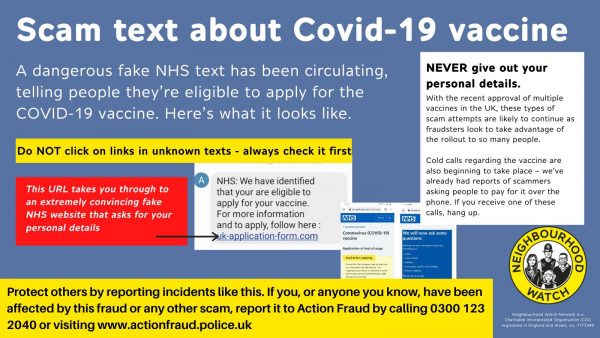Watch out for this Coronavirus scam

Scammers are taking advantage of the pandemic to target the public – make sure you don’t get caught out.
We’ve been made aware of a COVID scam making the rounds. It’s particularly targeting older people, but anyone can be vulnerable as attacks become more sophisticated.
NHS text scam
There have been reports coming in that people are receiving a text claiming to be from the NHS, offering them the COVID vaccine.
It looks very realistic, and tells victims to click on a link which appears to take them to the NHS website. They’re then asked to fill in a form and put in their bank details ‘for verification’ or payment purposes.
However, it’s actually from scammers who then steal victims’ money and personal information.
If you’re ever unsure of whether a message is legitimate, do not click on the link or give your personal details.
There are also some versions of the hoax that are calling people instead of texting, so if you receive a call asking you to pay for the vaccine or a test over the phone please hang up.
This Neighbourhood Watch advice graphic sums up the guidance:

Other scams
While the NHS vaccine scam looks particularly realistic, there are several others making the rounds at the moment too.
For example, there’s claiming to be from Test and Trace, telling victims they’ve been in contact with someone who’s tested positive for COVID and need to take a test. They then ask for a one-off fee for the test.
There is no fee for NHS testing and health authorities will never ask for payment details online or via the phone. Neither will your bank or your council.
Other scam callers may claim to be from the post office, your bank or council and other well-known names, designed to lull you into a false sense of security.
The hoaxes aren’t all online either. There have been reports of fake hand sanitiser and COVID test kits being sold door-to-door, or strangers offering to do shopping for elderly and vulnerable people and then running off with the money.
Top tips for staying safe
As people get savvy to one type of scam it’s likely others will pop up in its place, so make sure you’re aware of how to protect yourself. There are some tips below, but a good general rule is to trust your gut and if it seems too good to be true, it probably is.
1. Never give out your personal details over the phone or on a website you’ve been taken to via a link in an email or text.
2. If you’re unsure of any links you’ve been sent and you’re on a desktop or laptop, hover your mouse over the link. This will bring up the link address in the bottom left-hand corner of your browser, so you can check it looks legit.
3. Don’t give money, your bank card or your personal details to strangers that get in touch, even if they’re claiming to help you or be from a trusted source.
4. If someone’s pushing you to sign or pay for something on the spot say no and do some research yourself before buying.
If you, or anyone you know, have been affected by this fraud or any other type, you can report it to Action Fraud by calling 0300 123 2040 or via www.actionfraud.police.co.uk.
If Onward customers have any concerns or questions about COVID or your tenancy give us a call on 0300 555 0600


